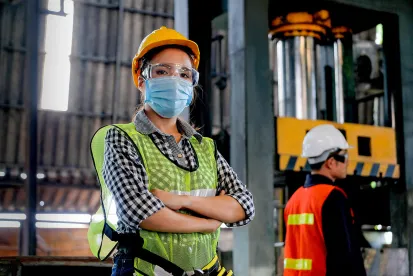The results are in from a comprehensive survey of leaders from several large US manufacturing sectors concerning the adoption of smart manufacturing processes and systems. The survey was conducted, in part, by LIFT, the Detroit-based Department of Defense manufacturing innovation institute, and polled 500 manufacturing industry personnel at the director level or above in ten sectors: aircraft/aerospace; automotive; defense; energy; food/beverage; gas/oil; industrial and commercial machinery; medical/surgical/dental; semiconductors; and shipbuilding/marine. While nearly 90% of those surveyed know that their organizations must adopt smart manufacturing processes and systems, and three in five respondents said their companies have already been using some level of smarter manufacturing in production, the survey also revealed that challenges to adopting smart manufacturing processes still exist.
For 58% of the respondents, the main challenge in moving toward smart manufacturing processes was the complexity of system integration, leading to a rarity of large-scale adoption at the systems level in small and medium-sized enterprises. Respondents indicated that some factors helpful in overcoming this challenge include increased funding; opportunities to consult with implementation experts; and partnering with a software vendor to co-create solutions. For larger companies, smart manufacturing could be implemented in phases by testing the deployment on a single product line before adopting the new processes company-wide.
Four in five respondents said their organizations have a firm commitment to a transition towards smart manufacturing, but over two-thirds (68%) expressed concern that no positive return on investment has yet been shown at comparable companies. This result appears to correlate with a concern expressed by 65% of respondents that costs of transitioning to smart manufacturing outweigh the benefits of doing so. This result varied by industry, with industries that manufacture high-value items using complex processes being more likely to view the cost-benefit favorably than those respondents producing goods further down the value scale. This suggests that as experience is gained with smarter manufacturing processes, implementation costs are likely to drop and adoption of smarter manufacturing techniques is likely to become more prevalent.
Despite these challenges, survey respondents acknowledged that smart manufacturing facilitates “reshoring” of the production of goods, which lowers transportation costs, reduces the variability of logistics, and stabilizes supply chains. This was especially true for respondents in the semiconductor industry, which had 90% of respondents indicating they are looking to bring production back to the US. Through the survey, senior leaders at manufacturing companies across a variety of sectors expressed strong interest in accelerating the transition to smarter manufacturing. The right partnerships can help manufacturers address the challenges and, as the survey says, Drive American Manufacturing into the Future.



 />i
/>i
